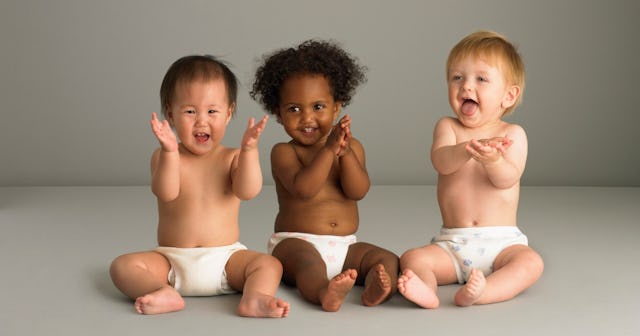When To Expect Baby Clapping, ‘Cause This Milestone Is The Cutest

Listen, we know that hearing a baby laugh is the sweetest sound. But you know what comes in a close second? When your little nugget puts their hands together and cues up the cutest round of applause ever. If you haven’t quite reached this adorable baby milestone yet, you’re now surely asking, “When do babies start clapping?” And we’re here to tell you when you can expect it — you know, so you can prepare your heart for the excessive warm-and-fuzzies headed its way.
Clapping isn’t just a super-cute thing babies do, though. Don’t get us wrong, it is super-cute. Obviously. But it’s also a really important step in the right direction where baby’s cognitive development is concerned. So, if you ask us, there are plenty of reasons to cheer for the impending arrival of your little one’s applause.
Why is clapping a baby milestone?
There are myriad reasons your baby learning how to clap is a big deal developmentally. For one, it shows that your child is learning how to communicate to you (and the rest of the world around them) how they feel. This kind of nonverbal communication paves the way for verbal communication. Clapping also requires considerable hand-eye coordination. Eventually, that clapping coordination will grow to the point that baby can clap on beat. Then it’s only a matter of time before they’re begging for a drum set, Mom!
So, when do babies start clapping?
Let us start with our standard reminder: All babies are different, meaning they may not all follow the same developmental timelines. Generally speaking, most babies begin to clap around 9 months of age. It typically follows fast on the heels of a few other milestones, like sitting up on their own and pushing or pulling themselves up.
Having said that, your baby might start clapping as early as 6 months old. On the flip side, they may not master mini-rounds of applause until around 10 or 11 months old. Just keep an eye out for it (as if you could miss such supreme cuteness!). Mention it to the pediatrician if baby is approaching their first birthday and you haven’t caught a clap sesh yet.
How can you encourage your baby to clap?
Since your baby will learn to clap from mimicking your movements, the best way to encourage clapping is to do it yourself! Clap for them when they eat all of their puffies. Crank up some kid-friendly songs and clap along to the beat. Even if your baby hasn’t quite picked up how to do it yet, act out a game of patty-cake. Basically any activity that involves you clapping could inspire your baby to start doing it, too. Another hack for teaching baby to clap is to say what you’re doing, i.e. “Yay, let’s all clap for baby! Clap, clap, clap!”
By the time your little one celebrates their first birthday, they may no longer just be clapping to mimic your actions. At that point, they may fully be embracing clapping as a way to communicate their joy and excitement to you. The best thing you can do to keep encouraging your baby’s clapping is to keep fostering that sense of excitement. When baby claps, clap right along with them! For your little one, few things are more exhilarating than seeing you just as excited as they are.
What’s next?
Well, a lot more clapping, suffice it to say. As your baby continues to master their physical and mental coordination, they’ll learn other hand motions. They’ll likely start waving a bit earlier than clapping. Then, around 12 months old, your little cutie will probably start pointing at things to let you know when something catches their eye (or, you know, when they want you to give it to them). Experts refer to this big developmental milestone as “shared attention.” Which is pretty much exactly how it sounds — your baby calls your attention to something that you both have an interest in.
But once baby has mastered clapping and other hand motions, there are tons of other exciting milestones coming your way, too. A few examples? Saying their first words and taking their first steps. Oh, Mama… what a fun time this is! If all of this doesn’t deserve a round of applause, we don’t know what does.
This article was originally published on